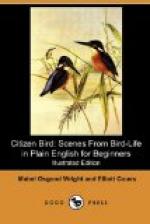“I thought Herons had long necks,” said Nat; “but this one doesn’t seem to have any neck at all.”
“Ah, but when it flies it folds its long neck, and thus draws its head down between its shoulders, while some of the Stork and Crane cousins poke out their heads in flying.”
“Are Storks and Cranes cousins of the Herons?” asked Dodo. “I know about Storks—they are in my fairy book. They live in the north country where little Tuk came from, and build their nests on roofs between chimneys, and stand a great deal on one leg in the water looking for frogs. Do Herons nest on roofs and stand on one leg, Uncle Roy?”
“They do not nest on roofs, but they often stand on one leg when watching for food, and when sleeping—in fact, they stand so much in this way that one leg is often stronger than the other, and they most certainly belong to the guild of Wise Watchers. The Black-crowned Night Heron who has just flown over is the most familiar member of his family hereabouts, and quite a sociable bird. He prefers to live the hotel life of a colony, instead of having a quiet home of his own, and so do almost all other members of the Heron family. These Night Herons flock back from warm countries in April, and by early May have built their rough nests of sticks in trees near the water, or over a marshy place. There is a colony of twenty or thirty nests on Marsh Island, Olaf tells me; in my boyhood days there used to be hundreds of them.
“In nesting-time a heronry, as such a colony is called, is a very noisy, dirty place; for they do not keep their homes neat and nice, like the tidy land birds. Mr. and Mrs. Night Heron call hoarsely enough to each other, but imagine three or four baby Herons crying from every nest—truly the parents can have but little rest, for day and night they must go frogging or fishing, to fill the stomachs of their red-eyed awkward children.
“When the nesting season is over, however, this Heron again becomes the night watchman of the marshes. The tinkling of the bell on the home-going cow is his breakfast bell, and sunset the signal for him to leave his roost. Then beware! little fishes and lizards—those red eyes are glowing for you! That long spear-shaped beak is ready to stab you to death! Froggy ‘who would a-wooing go,’ return quickly to your mother, without making any impertinent remarks about ‘gammon and spinach’ on the way, or something much more savage than the ‘lily-while duck’ will surely gobble you up! Stay in doors patiently, until sunrise sends the rough-clawed prowler back to his heronry again.”
“May we go to see the Herons some day? It would be so funny to go to a bird hotel and find everybody asleep, like the beauty in the wood,” said Dodo. “You shall certainly pay them a visit, but I doubt that you will find them as sound asleep as you imagine.”
The very next morning Olaf piloted the party across the meadows to the wood that was made an island by a little creek that threaded in and out among the reeds.




